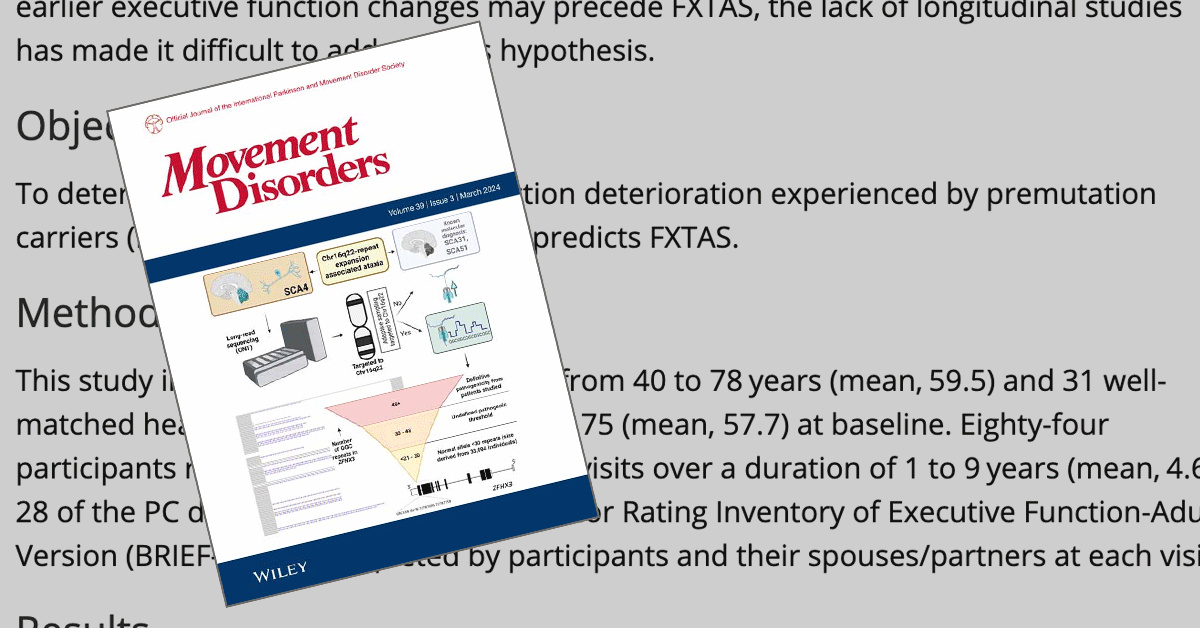Authors: David Hessl, PhD, Karina Mandujano Rojas, BS, Emilio Ferrer, PhD, Glenda Espinal, BS, Jessica Famula, MS, Andrea Schneider, PhD, Randi Hagerman, MD, Flora Tassone, PhD, and Susan M. Rivera, PhD[1]
Summary
People with Fragile X-associated tremor/ataxia syndrome (FXTAS) are not only affected by movement problems, but also by changes in cognition, especially what is referred to as “executive dysfunction” (problems with memory, disinhibition, attention, planning). Moreover, male individuals living with the premutation have subtle weaknesses in executive function even when they do not have FXTAS. Recent studies have shown that cognitive tests completed in a clinic setting can detect executive dysfunction before FXTAS begins, suggesting that these problems may precede or even help to predict later onset of the disease.
In this study, researchers aimed to determine whether executive function decline in daily life precedes and predicts FXTAS in people living with the premutation. This longitudinal study included 66 males living with the FMR1 premutation, ranging from 40 to 78 years, and 31 well-matched healthy controls, aged 40 to 75. 84 participants returned for 2 to 5 follow up visits over a duration of 1 to 9 years. 28 of the people living with the premutation developed FXTAS.
Researchers asked males living with the premutation to report on executive challenges in their daily lives to examine the real life impact of executive function changes. The results show that males living with the premutation do not have more problems than control participants without a premutation early on, but over time, they experience worsening executive function. Also, people living with the premutation who had more of these problems early on were at significantly higher risk to develop FXTAS later.
Why This Matters
This research was very revealing. Currently, we do not have accurate methods to predict who will develop FXTAS and who will not, or when the disease will start. However, if executive function changes precede FXTAS, then we can use assessments to identify people living with the premutation most at risk and get them started right away with lifestyle changes or even medicines to stop or slow down the development of the disease before more significant changes happen in the brain.
Next Steps
The findings in this study were based on a fairly large sample of males living with the FMR1 premutation, but the results focused on prediction of later development of FXTAS were based on a fairly small number of “converters.” Converters are people living with the FMR1 premutation who started out without FXTAS and then developed it later in the study.
Researchers are planning to expand this work significantly with larger numbers of participants, and want to emphasize follow-up on participants over a longer time period to learn more about risks and protective factors. Furthermore, researchers are studying how machine learning (computer models that can find the best combination of measures, such as brain imaging, motor, cognitive, blood biomarkers) can identify people living with the premutation at highest risk for later development of FXTAS.
Acknowledgments
The researchers express thanks to the participants and their families for their effort and dedication to this research, along with Dr. Corrisa Jacomini and Dr. Sundas Pasha for their neuropsychological examinations of participants. The researchers also note that the work was supported by the National Institute of Neurological Diseases and Stroke and the National Institute of Mental Health.






